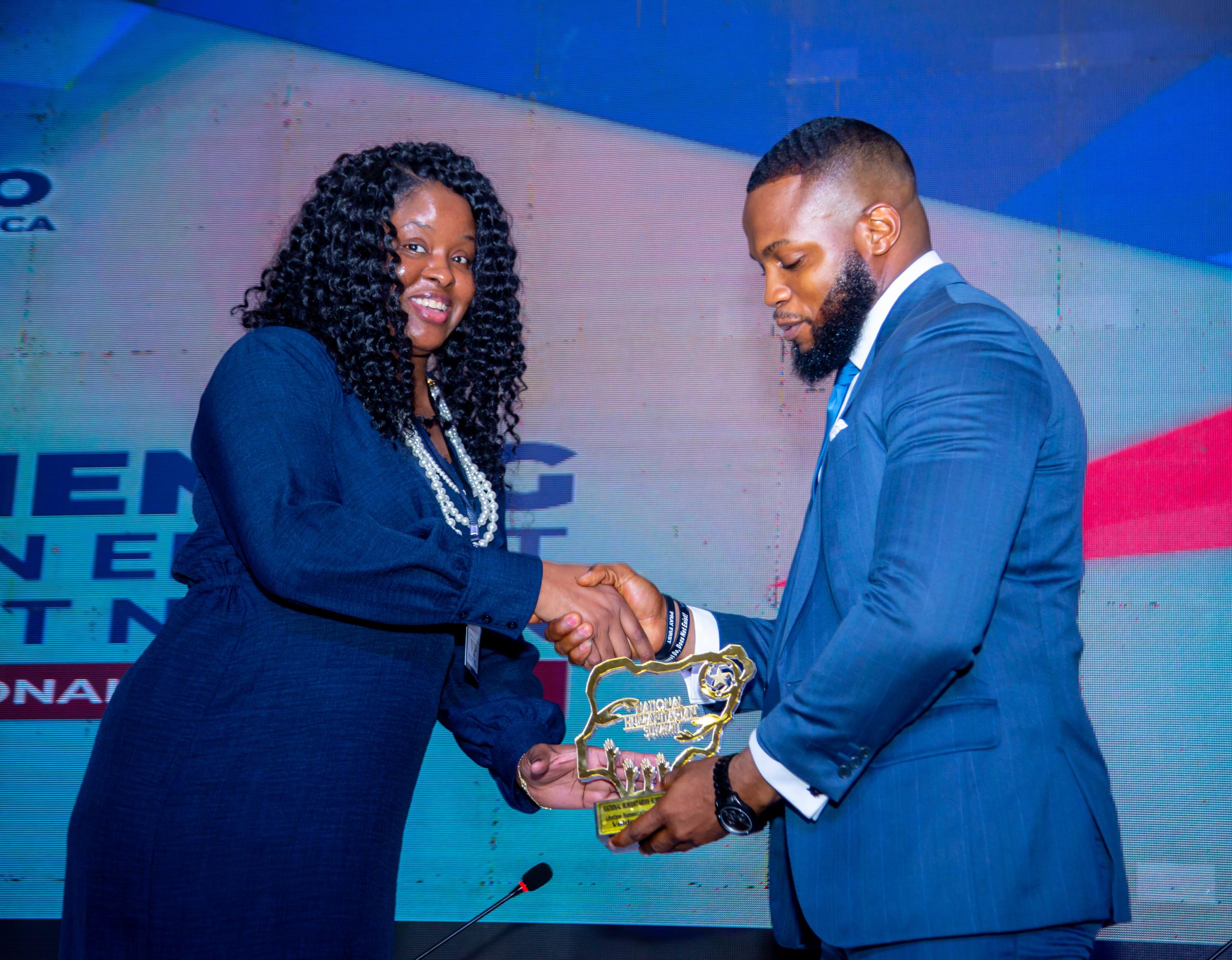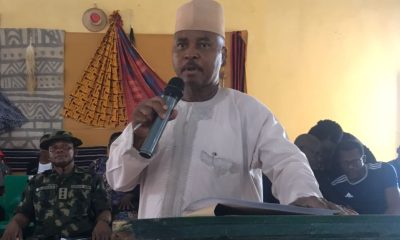FEATURES
Insurgency: The burden of Care for Wives, Offspring of Terrorists

By Sumaila Ogbaje
The 12 years of Boko Haram insurgency in the North East has created huge humanitarian crisis with thousands of women and children made homeless, orphaned and hungry, and without a secured future.
There are also thousands of children of Boko Haram insurgents whose parents surrendered and have to be mentally rejigged to ensure that they do not become a new generation of fighters who view the Nigerian state and people as enemies, like their parents did.
This mix of these despondent vulnerable groups and the potentially dangerous ones are currently being managed by the Nigerian military and Borno Government to not only restore their dignity and hope, but also create a sustainable future for them.
There are at least 65,660 women and children of surrendered Boko Haram fighters in rehabilitation camps in Borno and over a thousand children without parents or relatives.
In the 12 years of mindless killings and destructions, Boko Haram and Islamic States West Africa Province (ISWAP) terrorists have subjected women and children to extreme violent abuses, including abduction, sexual exploitation and violence, and forced marriages.
In its 2022 Humanitarian Needs Overview, the United Nations Office for the Coordination of Humanitarian Affairs, indicated that 8.4 million people, including women and children in the Northeast states of Borno, Adamawa and Yobe are in need of humanitarian aid.
The conflict which spread to areas surrounding the Lake Chad, has caused one of the world’s most severe and complex humanitarian crisis.
The psychosocial impact on the region, particularly on vulnerable groups is huge, requiring professional handling of the situation.
The Nigerian government has not reneged on this responsibility.
The government has been working with relevant humanitarian groups, regional governments and key stakeholders to manage the crisis.
The Military Joint Task Force North East Operation Hadin Kai, has continued to receive surrendered Boko Haram and ISWAP fighters together with their families.
So far, over 82,237 fighters and their families have surrendered, out of which 16,577 were active male fighters, 24,499 women and 41,161 children.
These figures exclude those that were arrested and awaiting prosecution, or rehabilitation and reintegration.
This category of terrorists are being held at the Joint Investigation Centre (JIC) at Giwa Army Barracks in Maiduguri, the Borno capital, and Kainji in Niger.
The JIC is for temporary holding and investigation of both suspected and confirmed terrorists.
Currently, there are a total of 1,893 of such suspects in custody, out of which 886 are awaiting prosecution.
The federal government, supported by the World Bank, has come up with Operation Safe Corridor, a humanitarian support programme to deradicalise, rehabilitate and reintegrate repentant terrorists, among them children forced into the conflict.
A total of 323 of such are currently undergoing de-radicalisation and rehabilitation at a centre set up in Gombe State, after which they will be reintegrated into the society and empowered to pursue legitimate businesses.
There are also hundreds of female detainees at the JIC, who also have children with them.
Some of these women were pregnant as at the time they were taken into the facility after their arrest or rescue by troops, while others were taken into the detention facility with children.
Checks by the News Agency of Nigeria (NAN) reveals that the military, in collaboration with International Committee of the Red Cross, is providing accommodation, care, educational services and healthcare for the detainees, especially children.
The JIC has a team of experts, including psychologists, investigators, mental health professionals and other experts drawn from various fields.
These professionals investigate the terror suspects and recommend them for either prosecution or deradicalisation, rehabilitation and reintegration.
Majority of the female detainees are wives of Boko Haram terrorists who have been profiled and categorized for either prosecution or deradicalization, rehabilitation and reintegration.
Aisha is one of them, and was pregnant as at the time she was apprehended. Seven months ago on May 15, she gave birth to a baby named Muhammadu.
According to her, she was adequately taken care of during the pregnancy and after the delivery, while little Muhammadu is also receiving appropriate medical support including routine immunisation against childhood killer diseases.
The immunization card of the little boy sighted by NAN showed that he received his last immunisation on Nov. 28, at the camp’s medical facility.
Aisha said she carried her pregnancy through and never contemplated aborting it, nor was she ever pressured to do so by any official of government or the military.
In Maiduguri, the bulk of the humanitarian burden as it affects women and children is in the three holding camps which have over 82,000 men, women and children.
The Hajj Camp in Maiduguri alone is a community of over 15,000 repentant terrorists and their families being cared for by the Borno Government.
There are currently over 10,000 women and children including new born at the camp, which has kept swelling due delivery of new babies on daily basis.
The medical officer in charge of the camp, Dr Muhammed Saleh said 263 babies were born between July and October, 2022.
He explained that 94 of the children were delivered in July, 98 in August, 60 in September, and 11 in October, adding that all the nursing mothers came into the camp while pregnant.
Saleh said that the camp currently has hundreds of pregnant women being adequately cared for, while new births are being recorded on daily basis.
He said the camp clinic handles about 500 patients daily, and in spite of the number, they have no record of any woman demanding for abortion.
“If there is any medical reason, such cases are referred to higher hospitals.
“We maintain the pregnant women and take care of their babies. We handle between 18 and 30 deliveries daily,” he said.
Mariam Bori, a mother of two from Bama, whose husband surrendered six months ago, told NAN that they were being well taken care of at the camp.
To fast track an end to the insurgency, the Borno government has come up with what it called, the ‘Borno Model’.
This is a community-driven initiative of disarmament, demobilisation and deradicalisation, as well as rehabilitation, reconciliation and reintegration.
The Special Adviser to the state Governor on Security, retired Brig.-Gen. Abdullahi Ishaq, said the initiative was to persuade fighters to drop their arms and come out of the bush.
According to him, about 3,500 low-risk persons and minors have been reintegrated into the society through the programme.
The Commissioner for Women Affairs and Social Development, Hajia Zuwaira Gambo, said the ministry had provided psychosocial support for about 35,000 women and children.
Gambo said the programme has both psychiatric and economic empowerment aspects.
“We engage them in skills acquisition as well as continuous counseling and mentoring, in partnership with agencies and organizations like the UNICEF.”
The commissioner said UNICEF built schools for the children and facilities for women to have safe space where those of them who were victims of gender based violence and other abuses are attended to.
“We have the skill acquisition section where they are being trained in various skills for both men and women.
“So far, it is a very holistic and comprehensive intervention, because we believe that having realised where they are coming from and having seen the sincerity in their surrender, the best we can do is to redirect them.
“The religious component is being addressed because when they came here we realised immediately that whatever they have done in the past has nothing whatsoever to do with religion; they don’t even understand what Islam is.
“We are not giving them fish; we are teaching them how to fish.
“Those who excel are given start-ups and you can see some of them displaying their entrepreneurial skills in the camp by trading in various articles,” she said.
At the Bulumkutu Interim Care Centre (ICC) where 14 Chibok school girls recently rescued by the military are being rehabilitated, it was a story of joy and pains for 25-year-old Rejoice Sanki, who was rescued with her two children.
Narrating her ordeal, Sanki told NAN that she was forced to marry a terrorist, who she intensely “detested even while remembering his name and face”.
Sanki said she was tortured when she initially refused to marry the terrorist, but had no option than to succumb to what they wanted.
The Chibok girl said she was lucky to escape with her children and was rescued by the military.
She thanked the government for taking care of her and her children, adding that her desire is to meet her parents and return to school.
“When I was in Chibok school, I was a science student and my ambition was to become a medical doctor.
“I have suffered so much, because this is not who I was and what I wanted to become,” Sanki said.
For 24-year-old Yana Pogu who was rescued with her four kids, among them a set of twins, her greatest desire is to reunite with her parents and take good care of the children.
Pogu said the Borno government has been taking good care of them and their kids, but would like to go back to school to be educated again, so as to be useful to her family and the society.
At the Bulinkutu centre, there are about 1,000 children separated from their parents as a result of the insurgency who were being catered for educationally, medically and mentally by the state government.
The Shehu of Borno, Alhaji Abubakar El-Kanemi, commended the military and the state government for returning displaced persons back to their ancestral homes, and taking care of those still in camps.
On the deradicalised and rehabilitated ex-fighters and their families, the traditional ruler said that no community had ever rejected any of them.
The Theatre Commander, Joint Task Force North East Operation Hadin Kai, Maj.-Gen. Christopher Musa, said the over 41,000 children of repentant and surrendered terrorists in their care are being professiinally managed, so that they don’t grow into a new generation of fighters.
“They will become more dangerous than their parents if not properly handled, because they grew up with hate and the wrong perception that everybody in Nigeria is an enemy,” he added.
Musa said the surrender of the terrorists has brought some measure of peace and stability to the region, adding that the major work left now is largely humanitarian in nature.
The Commander Medical Services, 7 Division, Nigerian Army, Lt.-Col. Adeniyi Ogunsakin, said though they largely manage wounded troops and barracks’ residents, they also take care of some rescued victims of Boko Haram that were wounded.
Ogunsakin said the military also attended to the rescued Chibok girls and their children, “because of the peculiarity of their case”.
He said one of the rescued Chibok girls came in with pregnancy and two babies, but was provided medical care at the facility.
Ogunsakin said she was later discharged from the hospital and handed over to the theatre command and subsequently to the state government.
On whether the hospital performs abortion for women that came out of terrorists’ den with pregnancies, Ogunsakin dismissed the insinuation as sheer mischief and preposterous.
“We don’t have the power to terminate anybody’s pregnancy in this hospital, and even if a mother ask us, we don’t grant such request because it is against our practice,” the commander added. (NANFeatures)
** If used, please credit the writer as well as the News Agency of Nigeria (NAN)
FEATURES
Rise In Male Hair Braiding: Fashion or decline in African values?

In recent years, the landscape of men’s fashion and grooming in Nigeria has seen a notable shift, with hair braiding emerging as a significant trend among young men.
Once seen as a style reserved for women, braided hairstyles are now redefining masculinity on the streets of Nigeria.
The practice has now evolved into a form of cultural expression, artistry, and personal identity for Nigerian males.
This growing trend is not just about fashion; it challenges cultural stereotypes, sparks conversations about gender norms, and signals a broader shift in how young Nigerian men see themselves and their identities.
Speaking on the trend, contributors appraised several factors contributing to the drift among young men in Nigeria society.
Mr Chinemerem Ndinojue, a youth and fashion enthusiast, described hair as a deep personal expression of identity.
“To me, hair is an extension of one’s personality; in African history, braids were more than fashion — they were symbols of resistance, identity, and even communication during the era of slavery.”
Ndinojue argued that, modern youths, particularly the Gen Z, use braids and other hairstyles to reflect creativity and stand out in industries like fashion and entertainment.
“Many of us are into music, design, content creation and our appearance is part of the brand; our parents rocked Afros in their time.
“It is the same expression in a different era; you cannot judge a person’s morality by their hairstyle,” he said.
However, Mr Michael Samson, a civil servant, sees the trend differently, describing it as a departure from African tradition and an influence of misguided westernisation.
“Our traditions have been replaced by modern civilisation; most of these boys are not celebrities; yet, they spend thousands on hair that serves no purpose.
“Worse still, some use these looks to cover fraudulent activities.’’
He cited an incident at a bank where a teenager, allegedly involved in internet fraud, claimed to have earned in a month what an older man earned in a lifetime.
“Such wealth without value is what leads to this arrogance; many use these styles to gain attention, not out of professionalism,” he said.
Echoing similar sentiments, Mrs Blessing John, another civil servant, said male hair braiding undermines cultural and moral standards.
“For me, it is not encouraging; we are Africans with strong cultural values; in our tradition, men do not braid their hair; even in professional spaces namely medicine, law, engineering, you do not see such hairstyles; there is a reason for that.”
She warned that many young men who braid their hair may be involved in societal ills such as drug abuse and cultism.
“We need value reorientation; parents must go back to teaching their children the right path; we must not forget where we come from,” she said.
Meanwhile, Mrs Ijeoma Azubuike-Okigbo, a communications professional, offered a more nuanced view.
While she admitted personal reservations about male braiding, she acknowledged the growing influence of pop culture.
“Young people today look up to personalities like VeryDarkMan among others who braid their hair and still command respect.
“If the society begins to accept it widely, it might one day become a part of our evolving culture.”
She said that many parents even took their young male children to salons for braids, suggesting the trend was already gaining ground across families.
“Ultimately, hair is natural; how one chooses to style it is personal; society is changing, and this may be part of that evolution,” she said.
Mr Toks Adesanya, a community elder, expressed strong disapproval over the rising trend of hair braiding and dreadlocks among young Nigerian males, describing the practice as a “taboo” and a deviation from cultural norms.
Adesanya lamented what he referred to as the erosion of African values and the shift in traditional masculinity.
He argued that hair braiding in men was not only alien to the culture but also reflective of a larger societal breakdown.
“It is a taboo for a man to braid his hair; when I see a boy or a man doing such things, I consider it a disgrace and a deviation from our tradition.
“Such hairstyles are not only culturally inappropriate but also expose young men to unnecessary suspicion by law enforcement.
“Thank God, the Special Anti-Robbery Squad of the Nigeria Police is no longer around; many young men would have fallen victim because such looks make them easy targets; police often associate such appearance with cybercrime or cultism.’’
Adesanya recalled a personal experience from his youth, when he briefly curled his hair to attend a party, only to be severely reprimanded by a family member.
“I felt accepted at the party, but when I got home, someone close to the family expressed deep disappointment; she said I had disgraced manhood; I felt ashamed and removed the curls the next day.”
He also attributed the trend to poor parenting, environmental influence, and a lack of religious and societal guidance.
“Our society no longer checks excesses; parents are absent, churches and mosques are silent, and this silence is taken as approval.
“Even in job interviews, appearances matter; a man with braids or dreadlocks may not be taken seriously if he should appear in such manner for job interviews,” he said.
Recently, Gov. Umar Bago of Niger banned wearing of dreadlocks among other things due to the rise of insecurity in the state.
Bago ordered security agents to clamp down on thugs and those abetting them in disrupting public peace in Minna, the state capital where violence had become a daily occurrence.
He also directed the arrest of people wearing dreadlocks, following a series of calls by terrorised residents of Minna to curb the worsening thuggery that had claimed the lives of many innocent people.
The governor said that thugs had turned the streets of Minna into a battleground since he took over leadership of the state.
As the debate continues, the question remains, is male hair braiding in Nigeria a fading of traditional values or an embrace of modern self-expression? (NANFeatures)
FEATURES
Miss Valdeen N. Pierre Honored with Humanitarian Award at the 2025 National Humanitarian Summit

In a remarkable celebration of humanitarian service and strategic collaboration, Miss Valdeen Pierre , Country Director – United State ; A New Thing International foundation ; was honored with the Humanitarian Award at the prestigious National Humanitarian Summit 2025, held at the Shehu Musa Yar’Adua Centre, Abuja.
The award recognizes Miss Pierre’s and other humanitarian leaders unwavering commitment to humanitarian causes, particularly her collaboration with A New Thing International Foundation on the SOBE Project (School Outreach for Better Education) across Sokoto, Kebbi, Plateau, Niger States and the FCT.
Her efforts have significantly contributed to improving access to quality education and raising awareness about social vices among schoolchildren in underserved regions.The summit drew an esteemed audience comprising multiple stakeholders across the humanitarian value chain, including the Minister of Youth Development, Minister of Humanitarian Affairs, Special Assistant to the President on Humanitarian Affairs, the First Lady of Kwara State, First Lady of Zamfara State, representatives of United Nations Humanitarian Agencies, NGOs, INGOs, and other key players in the humanitarian sector.

The event featured a vibrant mix of panel discussions, keynote addresses, and the unveiling of strategic development plans aimed at strengthening collaborative impact across Nigeria and beyond.
In his vote of thanks, Ambassador Kenneth Anetor, the Executive Director of A New Thing International Foundation and Chairman of the Planning Committee, delivered a passionate closing speech. He commended the honorees and stakeholders, issuing a clarion call for deeper collaboration and renewed commitment to advancing strategic organizational development goals. His rousing remarks inspired attendees to rise to the moment and forge stronger partnerships for sustainable impact.
Ambassador Anetor also extended profound appreciation to the summit’s convener, Ambassador Michael Timothy, of the Funmilayo Health Foundation Africa, for the opportunity to serve as Chairman of the Planning Committee, and for creating a platform that celebrates excellence in service and drives transformative conversations in humanitarian work.
The National Humanitarian Summit 2025 stands as a milestone in Nigeria’s journey toward inclusive, people-centered development, with Miss Valdeen Pierre’s recognition serving as a beacon of hope and an example of the power of global partnership in humanitarian efforts.
For media inquiries , information, or donations please contact:
Email: anewthingworldwide@gmail.com
Phone: +2347037474611
Website: www.antworldwide@gmail.com
FEATURES
A Pope’s Funeral and New Leadership Paradigm
By Dakuku Peterside
The world came together on a warm April morning in Rome. Under Bernini’s wide colonnade, a simple wooden coffin lay, almost shy against the grand marble of St Peter’s. It held the body of Jorge Mario Bergoglio, better known as Pope Francis; it also carried a final message, passed without words.
As I watched the funeral, I wondered if the message would be clear to leaders in places where leadership is often about show, instead of service. Nigeria, my country, came to mind, because its people long for leaders who serve with humility, rather than rule with power.At first glance, comparing a Pope to political leaders might seem unconventional, but important commonalities exist. Upon reflection, parallels are audacious: a Catholic pontiff and a republic’s president inhabit very different orbits. Yet, both preside over institutions that store immeasurable wealth – monetary, cultural, spiritual – and both command loyalties that can bless or wound the human spirit. The difference lies in the currency they spend. Francis traded almost exclusively in moral capital. His motorcade rarely stretched beyond a small Fiat. He lived in a guesthouse, took meals in a communal dining hall, and instructed that his funeral expenses be redirected to shelters for people experiencing homelessness.In stark contrast, many political leaders, notably in Nigeria, have consolidated power through patronage, wealth accumulation, and coercion, severely damaging their credibility and the public’s trust. Nigerian power, by contrast, is often measured in sirens, convoys, and security votes; in the distance a public office holder can place between himself and the exhaust of everyday life. The funeral invited a radical thought: What if legitimacy flowed from humility, not from the choreography of importance? This stress on the importance of humility in leadership could enlighten and provoke reflection on governance.Humility, though, is not a mannerism. It is a decision made daily, a refusal to situate oneself above the collective story. Francis’ last request, “bury me outside the Vatican walls”, was a slight tectonic shift, the first such break with tradition in over a century. It told pilgrims and presidents alike that holiness is not the property of marble tombs but of living deeds. Pope Francis was buried in a simple wooden coffin, instead of the traditional three-nested casket, symbolising a life dedicated to humility and service. This act is probably the first of its kind in papal history. This powerful statement of reform and decentralisation challenged entrenched traditions that maintain privilege.Nigerian leaders, accustomed to the trappings of power and privilege, could profoundly benefit from embracing servant-leadership that prioritises citizens’ welfare above personal gain. Imagine for a moment a Nigerian governor choosing to sleep occasionally in the wards of a rural clinic that lacks electricity, a senator commuting without escorts, or a budget speech opened with an apology to those whose dreams are still postponed. Such gestures, inspired by Pope Francis’ humility, would earn ridicule from cynics trained by years of theatrical piety, yet they might also crack the granite of distrust that politics has laid around the citizen’s heart.Throughout his papacy, Francis consistently demonstrated simplicity, living modestly, rejecting extravagance, and continuously expressing empathy for ordinary people. For Nigerian political leaders, adopting similar modesty could substantially enhance their legitimacy, distancing them from the extravagant lifestyles that alienate them from the realities of the people they govern. By following PopeFrancis’ example, Nigerian leaders could bridge the gap between themselves and the citizens they serve, fostering a deeper connection and understanding.The scenes in Rome offered other lessons as subtle as incense. Refugees and cardinals knelt side by side; presidents exchanged the sign of peace; atheists joined murmured prayers. I thought of the Plateau and Benue, of plains made fertile by rivers and yet stained by cycles of reprisal killings, each side armed with grievances as old as maps. If a Pope’s funeral could fold the devout and the doubtful into the same silence, perhaps state ceremonies in Nigeria could be reimagined as platforms for reconciliation, rather than patronage. Symbols matter because they reach the imagination before the policy can touch the pocket. A wooden coffin whispered more convincingly than any communiqué on inclusive governance ever could.None of this is to canonise a man in hindsight; Francis was criticised, resisted, and sometimes misunderstood. Reform always bruises the edges of comfort. But in death, he achieved what many living leaders rarely managed: he convinced opposing camps to pause their quarrels long enough to say, “Thank you, Father.” The applause that rippled through St Peter’s Square did not celebrate power captured; it celebrated power surrendered. How extraordinary and disconcerting to think that the shortest route to influence might be the surrender of privilege.I wish to reference the testimony of Vinod Sekar, the Hindu philanthropist who once described being in the presence of “someone relentlessly good,” pointing to Pope Francis. Sekar confessed that holiness ceased to be a place, temple, mosque, or cathedral, and became instead a verb: to shelter, to include, feed. Nigeria’s streets are crowded with worship houses, yet the mood often betrays scarcity – the scarcity of trust, of light, of potable water, of the belief that tomorrow might be gentler than today. What if holiness were measured not by the decibels of our prayers but by the quality of our public schools and hospitals? What if fiscal policy became a beatitude, not just a technical tool or to score cheap political points but a source of broad social good?Authentic goodness, the kind that disarms calculation, cannot be legislated; it must be modelled. Leaders who publish their asset declaration unprompted, reject grandiose titles, and break bread with market women without cameras in tow, begin to tilt the atmosphere. And atmospheres are contagious. When a Pope chooses simplicity, bishops take notice; when a governor chooses public transport, commissioners start to wonder whether the show of might is worth its cost. A single act does not topple corruption, but it can short-circuit the logic that sustains it.Critics will argue that symbolism is cheap and that coffins and cassocks cannot patch roads or fund hospitals. They are right, unless the symbol changes the story, and the story changes the budget. A nation cannot legislate self-respect into its citizens, while its leaders accumulate properties in distant capitals. Neither can it ask for sacrifice, while official lips sip champagne at state banquets. The funeral in Rome stubbornly insisted that credibility is the one commodity no treasury can purchase; it must be earned in increments of integrity.As I write, the image of that lone coffin lingers, framed by sunlight and the tear-streaked faces of strangers who felt seen by a man in white. Power looked strangely like the vulnerability that morning, and history tilted, not dramatically, but perceptibly, toward the possibility that public office might again be synonymous with public service. I imagine a version of that morning unfolding on Abuja’s Eagle Square: no imported SUVs, no choreography of arrival times to signal rank, only leaders standing shoulder to shoulder with nurses, farmers, students, and the internally displaced. I imagine a moment when applause signals not relief that the ceremony is over but gratitude that the example is true. Perhaps that is naïve. Yet every durable reform was once a naïveté stubborn enough to outlive its ridicule.
The cypress boards of Francis’ coffin will one day fade, but the memory of his choices will migrate from anecdote to folklore, from folklore to benchmark. Nigeria, a country whose anthem pleads to “build a nation where peace and justice shall reign”, needs new benchmarks more urgently than new oil blocks. It requires the quiet scandal of servant leadership to make corruption look as outdated as a triple-nested casket. Nigerian leaders should embrace key principles drawn from Pope Francis’ life and funeral rites: humility that transforms rulers into servant-leaders; real and courageous reforms dismantling corruption; moral authority grounded in integrity and humility; inclusivity that fosters unity across ethnic and religious divides; and a legacy defined by public trust rather than accumulated wealth.Ultimately, Pope Francis’ funeral provided a profound narrative on leadership that Nigerian political figures must internalise. By embodying these principles, they can cultivate a governance system rooted in moral authority, transparency, and service, genuinely transforming their nation and securing a legacy that endures beyond wealth or power. I end where I began, in the quiet of that Roman square, listening to chants swell like a rising tide, watching a coffin slip into the basilica, and feeling the strange comfort of a paradox: the smaller the ego, the wider the circle of souls who find shelter beneath its shade. This truth, more than any doctrine, is the gospel political leadership must embrace if it hopes to bury an age of hollow grandeur and awaken a season of genuine hope.Dakuku Peterside, a public sector turnaround expert, public policy analyst and leadership coach, is the author of the forthcoming book, “Leading in a Storm”, a book on crisis leadership.





























